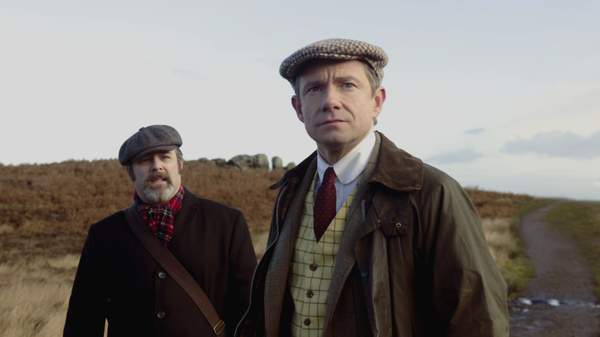Overview
When things supposedly go bump and jump in the night, Professor Philip Goodman (Andy Nyman) calls bullshit. But then his childhood hero (Leonard Byrne) comes calling, asking the professional paranormal debunker to investigate three cases — and warning that they just might challenge his long-held scepticism. That's the crux of British horror film Ghost Stories, which understands two important truths. Firstly, there's a little bit of wonder buried in every cynic, even if they won't or can't admit it. Secondly, the only thing that's more thrilling than a spooky tale told well is a number of them strung together.
Goodman's trio of supernatural incidents all involve strange and downright disturbing sightings, which he works through one by one. Employed in a deserted former asylum for women, nightwatchman Tony (Paul Whitehouse) just thinks that the power is flickering one evening, but that's soon the least of his worries. Driving through woodland in the thick of night with no one else in sight, the jumpy Simon (Alex Lawther) is involved in a hit and run with an unusual victim. As for wealthy banker Mike (Martin Freeman), who takes Goodman walking around his countryside property, he spins an account of personal woe and potential ghosts — all set in his sprawling mansion as his wife is about to give birth to their first child.
At first, these three vignettes all seem quite slight and standard, of the type that you might share around a crackling fire with marshmallows and a happy suspension of disbelief. That's by design, with the horror genre frequently drawing its power from appearing simplistic when the reality proves otherwise. Adapting their 2010 stage production of the same name for the screen, writing and directing duo Nyman and Jeremy Dyson keep the superficial details purposefully straightforward, while having fun playing with tropes and littering clues within each narrative within the narrative. This is an unnerving anthology that perfects the nuts and bolts of haunted storytelling, and yet also subverts expectations, offers enjoyable nods to horror greats gone by, and builds towards a big finale. Where it eventually lands is a little silly and obvious, but each individual segment — and its bookending framework — is staged in an impeccable and stirring manner.
The idea that Ghost Stories is 'staged' has multiple meanings, some that are best discovered by watching. Even if you're unfamiliar with the production in its original form — that is, literally on the stage — it's easy to see how it would work in the theatre. Crucially, however, this isn't a talky work that feels out-of-place on the screen. Rather, it's a broodingly gothic affair that's just as disquieting when it's toying with darkness, shadows and startling sounds as when it's giving its supernatural forces more concrete shape and form. Moving the tale to the cinema gives Nyman and Dyson plenty of room to revel in the movie's mood and imagery, creating a gloriously rich spookhouse — think bleak Yorkshire exteriors and thoroughly creepy interiors.
Ghost Stories is also a well-acted scarefest, with Nyman and Freeman the clear standouts. One plays a devout rationalist with conviction, the other rattles chains (albeit verbally, not physically) — and if you notice that the film is dominated by men with secrets, that's on purpose also. Being assaulted by the inexplicable is unsettling, as is being expected to just grin and bear life's ills, a trait that the movie's characters all share. The notion of hiding from pain provides thematic texture, deepens this entertaining take on the familiar, and helps Ghost Stories achieve what all anthology efforts strive for: leaving the audience wanting more.
